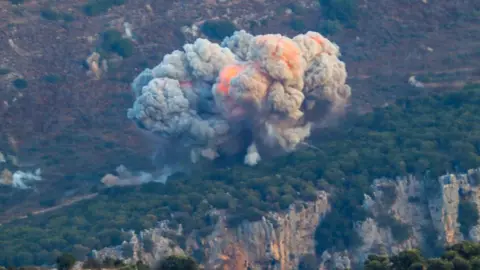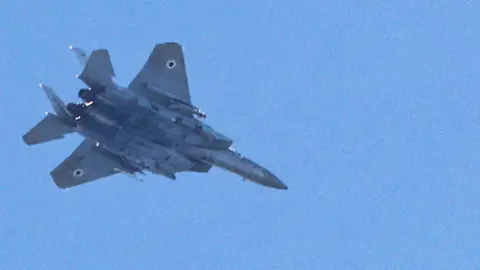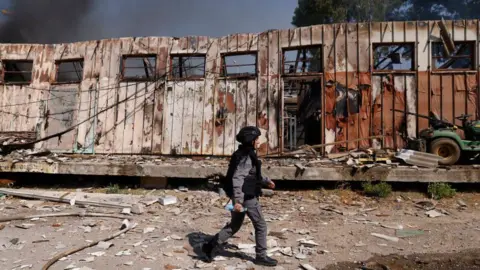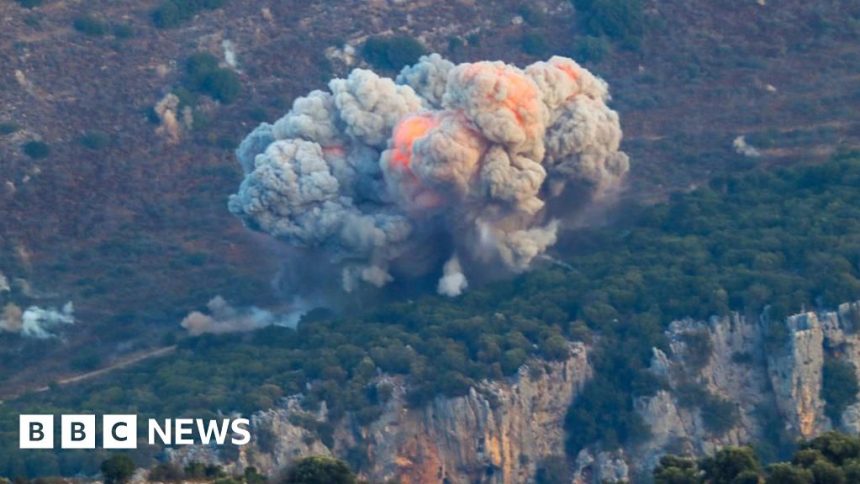Bowen: Israel is gambling Hezbollah will crumple but it faces a well-armed, angry enemy
 Getty Images
Getty ImagesIsrael’s leaders are jubilant about the progress of the offensive against Hezbollah that started with the detonation of weaponised pagers and radios and moved on to intense and deadly airstrikes.
Defence Minister Yoav Gallant did not hold back his praise after Monday’s air strikes.
“Today was a masterpiece… This was the worst week Hezbollah has had since its establishment, and the results speak for themselves.”
Gallant said airstrikes destroyed thousands of rockets that could have killed Israeli citizens. In the process Lebanon says Israel killed more than 550 of its citizens, including 50 children. That is almost half Lebanon’s dead in a month of war between Israel and Hezbollah in 2006.
Israel believes that a ferocious offensive will coerce Hezbollah into doing what it wants, inflicting so much pain that its leader Hassan Nasrallah and his allies and backers in Iran decide that the price of resistance is too high.
Israel’s politicians and generals need a victory. After almost a year of war Gaza has become a quagmire. Hamas fighters still emerge out of tunnels and ruins to kill and wound Israeli soldiers and are still holding Israeli hostages.
Hamas caught Israel by surprise last October. The Israelis did not see Hamas as a significant threat, with devastating consequences. Lebanon is different. The Israel Defence Forces (IDF) and the Mossad spy agency have been planning the next war against Hezbollah since the last war ended in a stalemate in 2006.
Israel’s leader, Prime Minister Benjamin Netanyahu, believes the current offensive is making big progress towards his declared objective of tipping the balance of power away from Hezbollah.
He wants to stop Hezbollah firing rockets over the border into Israel. At the same time, the Israeli military says the plan is to force Hezbollah back from the border and to destroy military facilities that threaten Israel.
Another Gaza?
The last week in Lebanon brings back echoes of the last year of war in Gaza. Israel issued warnings to civilians, as it did in Gaza, to move out of areas about to be attacked. It blames Hezbollah, as it blames Hamas, for using civilians as human shields.
Some critics as well as enemies of Israel said the warnings were too vague and did not give enough time for families to evacuate. The laws of war demand that civilians be protected, and forbid indiscriminate, disproportionate use of force.
Some of Hezbollah’s attacks on Israel have hit civilian areas, breaking laws designed to protect civilians. They have also targeted the Israeli military. Israel and key Western allies, including the US and UK, classify Hezbollah as a terrorist organisation.
Israel insists it has a moral army that respects the rules. But much of the world has condemned its conduct in Gaza. The ignition of a wider border war will deepen the gap at the centre of a highly polarised argument.
Take the pager attack. Israel says it was aimed at Hezbollah operatives who had been issued with the pagers. But Israel could not know where they would be when the bombs inside the pagers were triggered, which was why civilians and children in homes, shops and other public places were wounded and killed. That, some leading lawyers say, proves that Israel was using deadly force without distinguishing between combatants and civilians; a violation of the rules of war.
The fight between Israel and Hezbollah started in the 1980s. But this border war began the day after Hamas attacked Israel on 7 October, when Hassan Nasrallah ordered his men to begin a limited, but almost daily barrage over the border to support Hamas. It tied up Israeli troops and forced around 60,000 people in border towns to leave their homes.
Shadows of invasions past
A few voices in the Israeli media have compared the impact of the air strikes on Hezbollah’s capacity to wage war to Operation Focus, Israel’s surprise attack on Egypt in June 1967. It was a famous raid that destroyed the Egyptian air force when its aircraft were lined up on the ground. Over the next six days Israel defeated Egypt, Syria and Jordan. The victory created the shape of the current conflict as Israel captured the West Bank, including east Jerusalem, the Gaza Strip and the Golan Heights.
It is not a good comparison. Lebanon, and war with Hezbollah, is different. Israel has inflicted heavy blows. But so far it has not stopped Hezbollah’s capacity or will to fire into Israel.
Israel’s earlier wars with Hezbollah were grinding, attritional and never produced a decisive victory for either side. This one might go the same way, however satisfying the last week of offensive action has been for Israel, its intelligence services and its military.
Israel’s offensive rests on an assumption – a gamble – that a point will come when Hezbollah will crumple, retreat from the border and stop firing into Israel. Most observers of Hezbollah believe it will not stop. Fighting Israel is the main reason why Hezbollah exists.
That means Israel, just as reluctant to admit defeat, would have to escalate the war further. If Hezbollah continued to make northern Israel too dangerous for Israeli civilians to return home, Israel would have to decide whether to launch a ground offensive, probably to capture a strip of land to act as a buffer zone.
 Getty Images
Getty ImagesIsrael has invaded Lebanon before. In 1982 its forces swept up to Beirut to try to stop Palestinian raids into Israel. They were forced into an ignominious retreat in the face of fury at home and abroad, after Israeli troops held the perimeter as their Lebanese Christian allies massacred Palestinian civilians in the Sabra and Shatila refugee camps in Beirut.
By the 1990s Israel still occupied a broad band of Lebanese land along the border. Today’s Israeli generals were then young officers, who fought in endless skirmishes and firefights against Hezbollah, which was growing stronger as it fought to drive Israel out. Ehud Barak, then Israel’s prime minister and a former chief of staff of the IDF, withdrew from the so-called “security zone” in 2000. He decided that it did not make Israel any safer and was costing Israel the lives of too many soldiers.
In 2006 an ill-judged raid by Hezbollah across the tense and highly militarised border killed and captured Israeli soldiers. After the war ended Hassan Nasrallah said he would not have allowed the raid had he realised what Israel would do in return. Ehud Olmert, by then Israel’s prime minister, went to war.
At first Israel hoped air power would stop rocket attacks into Israel. When it did not, ground troops and tanks once again rolled back over the border. The war was a disaster for Lebanese civilians. But on the last day of the war, Hezbollah was still launching salvoes of rockets into Israel.
Wars present and yet to come.
Israel’s commanders know that entering Lebanon under fire would be much more formidable military challenge than fighting Hamas in Gaza. Hezbollah has also been making plans since the end of the 2006 war, and would be fighting on home ground, in south Lebanon which has plenty of rugged, hilly terrain that suits guerrilla tactics.
Israel has not been able to destroy all the tunnels Hamas dug through sand in Gaza. In the borderlands of south Lebanon, Hezbollah has spent the last 18 years preparing tunnels and positions in solid rock. It has a formidable arsenal, supplied by Iran. Unlike Hamas in Gaza, it can be resupplied by land through Syria.
The Center for Strategic and International Studies, a think tank in Washington DC, estimates that Hezbollah has around 30,000 active fighters and up to 20,000 reserves, mostly trained as mobile small units of light infantry. Many of its men have combat experience fighting in support of the Assad regime in Syria.
Most estimates say that Hezbollah has something between 120,000 and 200,000 missiles and rockets, ranging from unguided weapons to longer-range weapons that could hit Israel’s cities.
 Getty Images
Getty ImagesIsrael may be gambling that Hezbollah will not use all of them, fearful that the Israeli air force will do to Lebanon what it did to Gaza, turning entire towns to rubble and killing thousands of civilians. Iran might not want Hezbollah to use weapons it would like to reserve as insurance against an Israeli attack on Iran’s nuclear facilities. That’s another gamble. Hezbollah might decide to use more of its arsenal before Israel destroys it.
With the war continuing in Gaza, and rising levels of violence on the occupied West Bank, Israel would also have to contemplate a third front if it invaded Lebanon. Its soldiers are motivated, well trained and equipped, but the reserve units that provide much of Israel’s fighting power are already feeling the strain after a year of war.
A diplomatic dead end
Israel’s allies, led by the United States, did not want Israel to escalate the war with Hezbollah and do not want it to invade Lebanon. They insist that only diplomacy can make the border safe enough for civilians to return to their homes on either side of it. An American envoy has worked out an agreement, partly based on UN Security resolution 1701 that ended the 2006 war.
But diplomats have their hands tied without a ceasefire in Gaza. Hasan Nasrallah has said Hezbollah will only stop attacking Israel when the Gaza war stops. At the moment neither Hamas nor the Israelis are prepared to make the necessary concessions that would produce a ceasefire agreement in Gaza and a swap of Israeli hostages for Palestinian prisoners.
As Israeli air strikes continue to pound Lebanon, civilians who were already struggling to provide for their families in a broken economy face terrible pain and uncertainty. Fear crosses front lines. Israelis know that Hezbollah could do them much worse damage than they have in the last year.
Israel believes the time has come to be aggressive and audacious, to blast Hezbollah away from its borders. But it faces an obdurate, well-armed and angry enemy. This is the most dangerous crisis in the long year of war since Hamas attacked Israel and at the moment nothing is stopping it spiralling towards something much worse.








